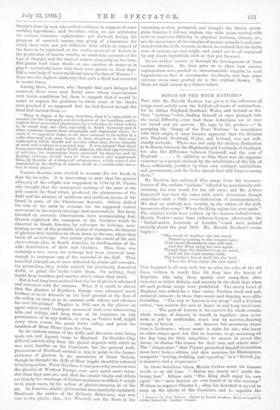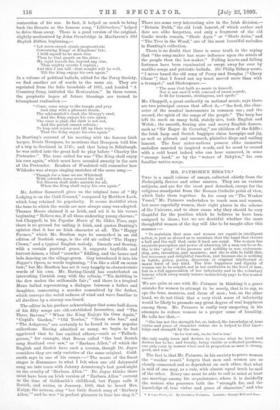SONGS OF THE FOUR NATIONS.*
" The worst of weather can but mend, There's a turning to the longest lane ; E'en rascal Roundhead rule will end, And the King enjoy his own again. Though boar the butcher's axe we must,, And see the royal martyr slain, The butcher's brood shall bite the dust, When the King enjoys his own again."
This doggerel is all very well, but we miss the echo of the old lines, written in words that bit deep into the hearts of Royalists who sang them openly over camp-fires after victories or bitter defeats, and secretly in the dark days when all such profane songs were prohibited. The merry heart of England was stifled for a time under Puritan cloak and sad- coloured raiment ; in those days music and dancing were alike forbidden. "The way to heaven is too steep," said a Puritan writer, "too narrow, for men to dance in and keep revel-rout.
The gate of heaven is too narrow for whole rounds, whole troops, of dancers to march in together : men never went as yet by multitudes, much leas by morrioe-dancing troops, to heaven not dancers but mourners, whose tune is Lachrynue ; whose music is sighs for sin ; who know no other cinque-pace but this to heaven ; to go mourning all the day long for their iniquities ; to mourn in secret like doves; to chatter like cranes for their own and others' sins.' The " cinque-pace " that Prynne permitted himself to mention must have been a solemn and slow measure, for Shakespeare compares "wooing, wedding, and repenting" to a "Scotch jig, a measure, and a cinque-pace."
In those troublous times, Martin Parker wrote his famous words to an old tune. "'Marry me, marry me,' quoth the bonny lass." Ritson calls "The King shall enjoy his own again" the "most famous air ever heard of in this country." Written to support Charles I.; after his downfall it served to keep up the spirits of the Cavaliers, and to expedite the * Songs of tho Four Nutions. Edited by Harold Boulton; Music arranged by Arthur Somervell. London I Cramer. THE title Mr. Harold Boulton has given to his collection of songs must satisfy even the boldest advocate of nationalism, for he claims England, Scotland, Wales, and Ireland as dis- tinct "nations,"—but, finding himself at once plunged into the racial difficulty, owns that these definitions are at once too broad and too narrow. He says in his preface :—" In grouping the Songs of the Four Nations' in accordance with their origin, it soon became apparent that the division into England, Scotland, Wales, and Ireland, was not suffi- ciently accurate. There was not only the obvious distinction to be drawn between the Highlands and Lowlands of Scotland, but also the difference between Cornwall and the rest of Engl and In addition to this, there was the separate existence as a people claimed by the inhabitants of the Isle of Man, sufficiently justified by their own national institutions and government, and the Celtic speech that still lingers among them."
Mr. Boulton has collected fifty songs from the treasure- houses of the various "nations" referred to, occasionally sub- stituting his own words for the old ones ; and Mr. Arthur Somervell has reset the tunes with much cleverness, though sometimes with a little over-elaboration of accompaniment. We find an entirely new version, by the editor, of the well- known cavalier-song, " When the King enjoys his own again." The original words were written by the famous ballad-writer, Martin Parker—some time alehouse-keeper, afterwards the "Ballad-maker Laureate of London "—and were printed secretly about the year 1643. Mr. Harold Boulton's versea begin :— restoration of his son. In fact, it helped as much to bring -back the Stuarts as the famous song, " Lilliburlero," helped to drive them away. There is a good version of the original, slightly modernised by John Oxenbridge in Macfarren's Old English Ditties, beginning,— "Let moon-struck cheats prognosticate
Concerning Kings' or Kingdoms' fate, I hold myself to be more wise Than he that gazetb on the skies ; My sight travels far, beyond any star, Thus mighty secrets I explain ; And this I can tell—that nought will be well, Till the King enjoys his own again."
In a volume of political ballads, edited for the Percy Society, we find another set of words to the same air. They are reprinted from the folio broadside of 1661, and beaded "A Countrey Song, intituled the Restoration." In these verses, the prophetic hopes of future blessings are turned to triumphant realisation :— "Come, come away to the temple and pray And sing with a pleasant strain,
The schismatick's dead, the liturgy's read, And the King enjoys his own again. The vicar is glad, the clerk is not sad, And the parish cannot refrain ; To leap and rejoice and lift up their voice, That the King enjoys his own again."
In Bunting's account of his meeting with the famous Irish harper, Denis Hempson, he mentions that Hempson told him of a trip to Scotland in 1745; and that being in Edinburgh, be was called into the great hall to play before "Charley the Pretender." The tune called for was "The King shall enjoy his own again," which must have sounded sweetly in the ears of the Pretender. Readers of Woodstock will remember how Wildrake was always singing snatches of the same song :— " Though for a time we see Whitehall With cobwebs hung around the wall ; Yet Heaven shall make amends for all,
When the King shall enjoy his own again."
Mr. Arthur Somervell gives us the original tune of "My Lodging is on the Cold Ground," composed by Matthew Lock, which long retained its popularity. It seems doubtful when the tune to which the words are now always sung was adopted. Thomas Moore claimed it as Irish, and set it to his verses beginning "Believe me, if all those endearing young charms ;" but Chappell, in his Popular Music of the Olden Time, says there is no ground for calling it Irish, and quotes Bunting's opinion that it has no Irish character at all. The "Happy Farmer," which Mr. Boulton says he unearthed in an old edition of Scottish songs, is the old air called "The Happy Clown," and a typical English melody. Smooth and flowing, with a certain pastoral grace, it suggests hayfields and harvest-homes, a blind " crowder " fiddling, and the lasses and lads dancing on the village-green. Gay introduced it into his Beggar's Opera, to words beginning, "I'm like a skiff on ocean tost;" but Mr. Boulton has set it very happily to characteristic words of his own. Mr. Baring-Gould has contributed an interesting Cornish song with the refrain, "Tis dabbling in the dew makes the milkmaids fair;" and there is a tragical Manx ballad representing a dialogue between a father and daughter, concerning a murder committed by the father, whieh conveys the weird sadness of wind and wave familiar to all dwellers by a stormy sea-board.
The editor in his preface acknowledges that some half-dozen • of his fifty songs arc old-established favourites, and "The Three Ravens," "When the King Enjoys his Own Again," "Cupid's Garden," "Old Towler," "Scots wha hae," and The Ashgrove," are certainly to be found in most popular collections. Having admitted so many, we begin to feel aggrieved that he has omitted others,—such as " Tulloch- gorum," for example, that Burns called "the best Scotch song Scotland ever saw," or "Barbara Allen," of which the English and Scotch have each a version, though Dr. Joyce considers they are only varieties of the same original. Gold- smith says in one of his essays :—" The music of the finest singer is dissonance to what I felt when our old dairymaid sung me into tears with Johnny Armstrong's last good-night on the cruelty of Barbara Allen?" Dr. Joyce thinks there must have been an Irish version of "Barbara Allen" current in the time of Goldsmith's childhood, but Pepys calls it Scotch, and writes, in January, 1666, that he heard Mrs. Knipp, the actress, sing "her little Scotch song of Barbary Allen," and be was "in perfect pleasure to hear her sing it." There are some very interesting airs in the Irish division,— "Drimin Dubh," the old Irish lament, of which author and date are alike forgotten, and only a fragment of the old Gaelic words remain, " Shule Agra" or " Shule Artin," and "The Tree in the Wood," one of the most beautiful melodies in Bunting's collection.
There is no doubt that there is some truth in the saying that "the song-maker has more influence upon the minds of the people than the law-maker." Failing hearts and falling fortunes have been reanimated or swept away for ever by warlike songs and patriotic ballads. Sir Philip Sidney wrote, "1 never heard the old song of Percy and Douglas [" Chevy Chase "] that I found not my heart moved more than with a trumpet ;" and Shakespeare :— "The man that hath no music in himself,
Nor is not mov'd with concord of sweet sounds, Is fit for treasons, stratagems, and spoils."
Mr. Chappell, a great authority on national music, says there are two principal causes that affect it,—" the first, the char- acter of the musical instruments in common use ; and the second, the spirit of the songs of the people." The harp has left its mark on many bold, stately airs, both English and Welsh ; the smooth, flowing airs and merry English dances, such as "Sir Roger de Coverley," are children of the fiddle ; the Irish harp and Scotch bagpipes claim hornpipe and jig, as well as pibroch and coronach, plaintive dirge and wailing lament. The four sister-nations possess alike immortal melodies married to inspired words, and he must be cursed with a cold heart indeed who can hear unmoved, in some "strange land," or by the "waters of Babylon," his own familiar native songs.



































 Previous page
Previous page